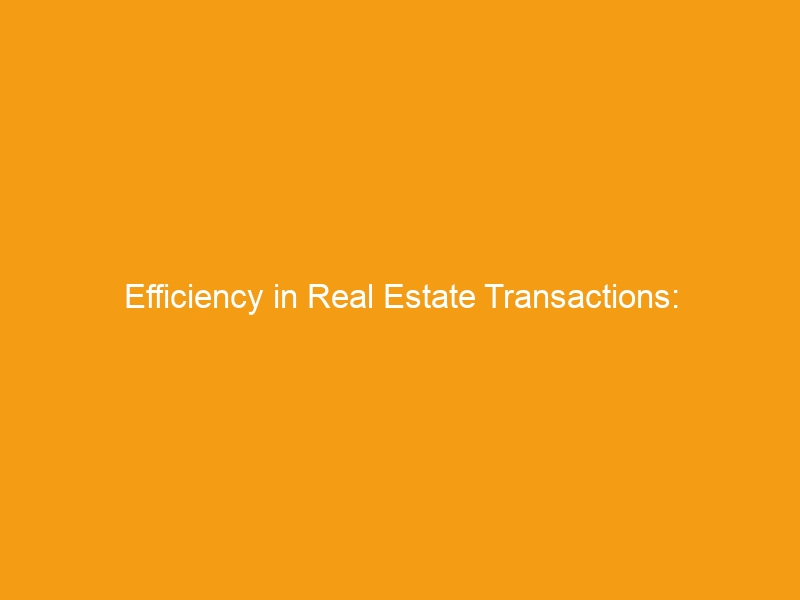Introduction to Real Estate Transactions
Real estate transactions are complex processes that involve an array of parties, like buyers, sellers, agents, and, occasionally, legal advisors. Each party plays a critical role in moving a property from being just listed to being successfully sold. For many sellers, especially those seeking a quick sale, options like Property Max buys Oregon houses provide a streamlined solution in specific markets, removing some of the more cumbersome traditional procedures. At the heart of real estate lies the need for efficiency because, in this industry, time is often synonymous with money. An understanding of what makes a transaction efficient can make a significant difference in terms of financial and emotional outcomes.
Oregon house buyers are often attracted to the state’s diverse landscapes, including coastal regions, mountains, and forests, offering a variety of properties. Many buyers seek homes in cities like Portland, Eugene, and Bend for their growing job markets, vibrant culture, and access to outdoor activities. The real estate market in Oregon has seen a steady increase in demand, with home prices rising due to a mix of population growth and limited housing inventory.
Common Challenges in Home Selling
Selling a home is seldom straightforward. Sellers grapple with many challenges ranging from setting the right asking price to ensuring their home stands out in a crowded marketplace. Emotional ties to the property can complicate decisions, leading to hesitation during negotiation and potentially affecting the sale outcome. Additionally, market trends can dictate the timing, impacting when a home should be listed to attract the most interest. The interplay of these dynamics can leave sellers feeling overwhelmed. A strategic approach and preparedness, like working with experts from Property Max in Oregon, can help mitigate these challenges, allowing sellers to navigate the process with greater ease and confidence.
The Role of Technology in Real Estate
The rise of technology in real estate has transformed traditional selling methods. Now, sellers can list and market their homes with a few clicks, harnessing digital platforms to reach a wider audience quickly. Innovations such as virtual tours allow potential buyers to experience properties from afar, overcoming geographical barriers and saving time. AI-driven tools provide market insights and predictive analytics, enabling sellers to make informed decisions. These advancements reduce the administrative burden on sellers and enable faster more accurate transactions.
Professional Insights: Real Estate Agents
Despite technological advances, the role of a seasoned real estate agent remains invaluable. Their deep understanding of market conditions and skillful negotiation tactics are critical assets in the selling process. Real estate agents act as conductors, harmonizing the various aspects of a property sale, from pricing strategy to final negotiations. Their expertise ensures that all pertinent details are addressed, which smooths the transactional process, maximizes profitability, and minimizes stress for the seller. In many cases, having a trusted agent on your team can be the difference between a drawn-out, challenging sale and a seamless, profitable transaction.
Managing Documentation and Paperwork
The plethora of paperwork in a home sale can be overwhelming without a strategic approach. Contracts, legal documents, and financial disclosures must all be meticulously organized to avoid pitfalls. Today’s digital tools simplify this task, allowing seamless access and storage and dramatically reducing errors. Proper documentation prevents last-minute hitches, which could derail an otherwise smooth transaction. Ensuring that all paperwork is prepared well in advance of any deadlines will help expedite the selling process and contribute to a less stressful experience.
Home Appraisal and Evaluation
Accurate appraisals are the cornerstone of setting a realistic asking price. An overvalued listing may languish on the market, while undervaluation can lead to financial losses. Engaging a reputable appraiser ensures an objective assessment of the property’s worth, balancing market conditions with unique property features. This streamlines the selling process and boosts seller confidence in the final listing price, increasing the likelihood of a successful sale.
Marketing Strategies to Sell Your Home
The power of effective marketing cannot be understated when it comes to selling a home. High-quality photographs, comprehensive listings, and proper staging inspire interest and can significantly speed up the selling process. Online platforms allow sellers to showcase their homes to a global audience, reaching potential buyers who may otherwise remain inaccessible. A well-marketed home not only attracts more offers but can also inspire competition among buyers, potentially driving up the selling price.
Conclusion: Achieving a Smooth Transaction
With various moving parts, real estate transactions demand attention to detail and strategic planning to be successful. By harnessing the power of technology, leveraging professional expertise, and employing efficient marketing techniques, sellers can streamline their processes, achieving faster and more profitable home sales. This integrated approach ensures a less stressful and more rewarding selling experience, highlighting the importance of planning and efficiency in real estate transactions.

